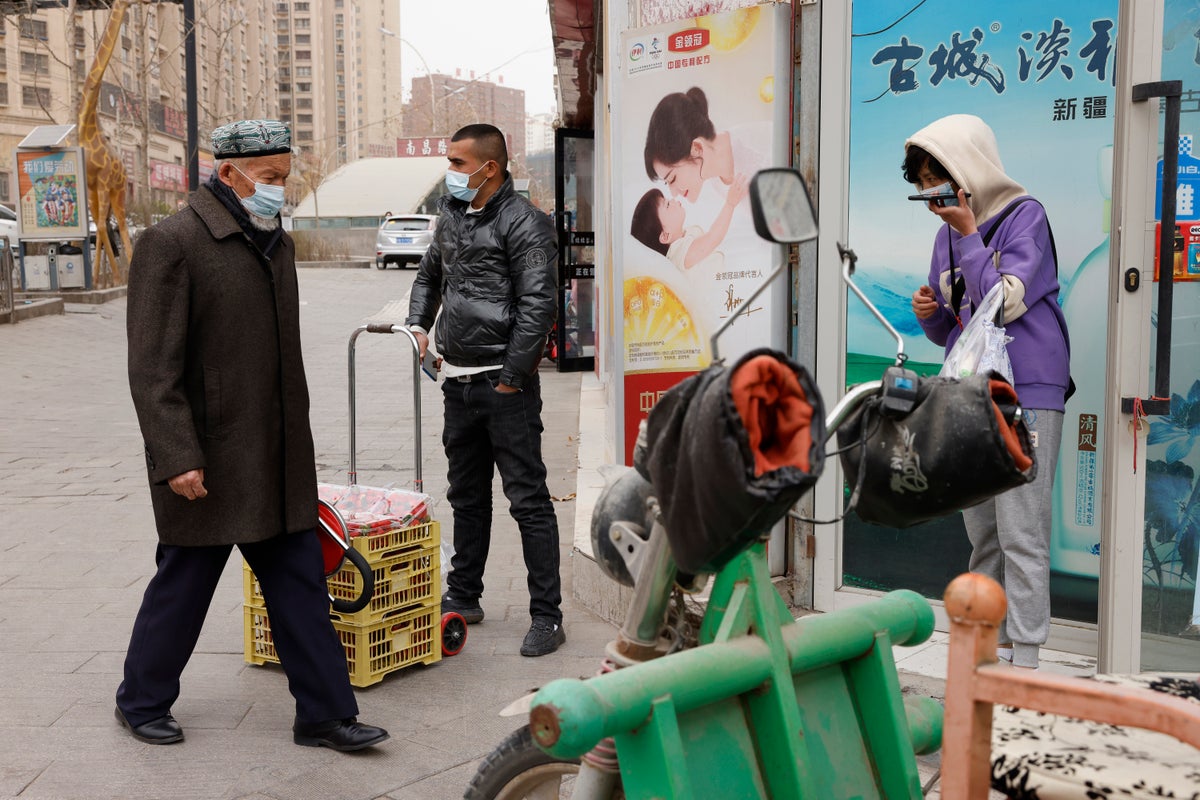
Residents of a city in China’s far west Xinjiang region say they are experiencing hunger, forced quarantines and dwindling supplies of medicine and daily necessities after more than 40 days in a virus lockdown.
Hundreds of posts from Ghulja riveted users of Chinese social media last week, with residents sharing videos of empty fridges, feverish children, and people screaming from their windows.
The dire conditions and food shortages are reminiscent of a harsh lockdown in Shanghai this spring, when thousands of residents posted online, complaining they were delivered rotting vegetables or denied critical medical care.
But unlike in Shanghai, a glittering, cosmopolitan metropolis of 20 million people and home to many foreigners, the harsh lockdowns in smaller cities such as Ghulja have received less attention.
As more infectious variants of the coronavirus creep into China, flare-ups have become increasingly common. Under China's “zero-COVID” strategy, tens of millions or people are experiencing rolling lockdowns, paralyzing the economy and making travel uncertain.
The lockdown in Ghulja is also evoking fears of police brutality among the Uyghurs, the Turkic ethnic group native to Xinjiang. For years, the region has been the target of a sweeping security crackdown, ensnaring huge numbers of Uyghurs and other largely Muslim minorities in a vast network of camps and prisons. An earlier lockdown in Xinjiang was particularly tough, with forced medication, arrests, and residents being hosed down with disinfectant.
Yasinuf, a Uyghur studying at a university in Europe, said his mother-in-law sent fearful voice messages this weekend saying she was being forced into centralized quarantine because of a mild cough. The officers coming for her reminded her, she said, of the time her husband was taken to a camp for over two years.
“It’s judgement day,” she sighed, in an audio recording reviewed by The Associated Press. “We don’t know what’s going to happen this time. All we can do now is to trust our creator.”
Food has been in short supply. Yasinuf said his parents told him they were running low on food supplies, despite having stocked up before the lockdown. With no deliveries, and barred from using their backyard ovens for fear of spreading the virus, his parents have been surviving on uncooked dough made of flour, water and salt. Yasinuf declined to give his surname for fear of retribution against his relatives.
He hasn’t been able to study or sleep in recent days, he said, because the thought of his relatives back in Ghulja keeps him up at night.
“Their voices are always in my head, saying things like I’m hungry, please help us,” he said. “This is the 21st century, this is unthinkable.”
Nyrola Elima, a Uyghur from Ghulja, said her father was rationing their dwindling supply of tomatoes, sharing one each day with her 93-year-old grandmother. Another relative, her aunt, was panicking because she lacked milk to feed her 2-year-old grandson.
Last week at a news conference, the local governor apologized for “shortcomings and deficiencies” in the government’s response to the coronavirus, alluding to “blind spots and missed spots," and promised improvements.
But even as authorities acknowledged the complaints, the censors worked to silence them. Posts were wiped from social media. Some videos were deleted and reposted dozens of times as netizens battled censors online.
Multiple people in the region told AP the posts online reflected the dire nature of the lockdown, but declined to detail their own situations, saying that they feared retribution.
On Monday, local police announced the arrests of six people for “spreading rumors” about the lockdown, including posts about a dead child and an alleged suicide, which they said “incited opposition” and “disrupted social order."
Leaked directives from government offices show that workers are being ordered to avoid negative information and spread “positive energy” instead. One directed state media to film “smiling seniors” and “children having fun” in neighborhoods emerging from the lockdown.
“Those who maliciously hype, spread rumors, and make unreasonable accusations should be dealt with in accordance with the law,” one notice warned.
The AP was unable to independently verify the notices. The Chinese Foreign Ministry did not immediately respond to a request for comment.
As the authorities mobilize, conditions have improved for some. One resident, reached by phone, said food deliveries resumed after stopping for a couple of weeks. Residents in her compound are now allowed to talk walks in their courtyard for a few hours a day.
“The situation is gradually improving, it’s gotten a lot better,” she said.
Authorities have ordered mass testing and district lockdowns in cities across China in recent weeks, from Sanya on tropical Hainan island to southwest Chengdu, to the northern port city of Dalian.
In the city of Guiyang, in mountainous southern Guizhou province, a zoo put out a call for help last week, asking for pork, chicken, apples, watermelons, carrots and other produce out of concern they could run out of food for their animals.
Elsewhere in the city, residents in one neighborhood complained of hunger and missing food deliveries, prompting a surge of comments online. Local officials apologized, saying that despite their best efforts, they were overwhelmed.
“Due to lack of experience and inappropriate methods,” they said in a public notice, “the supply of basic necessities wasn’t enough, bringing inconvenience to everyone. We are deeply sorry.”







